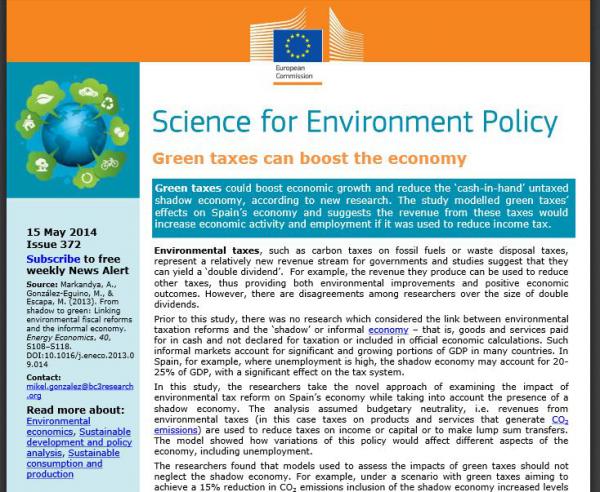- Home
- Press Area
- BC3 News
- The European Commission selects a BC3 research for its quality and policy relevance
From January 2016 onwards all the BC3 News are available at news.bc3research.org.
Please find copied below the News previous to January 2016
The European Commission selects a BC3 research for its quality and policy relevance
The European Commission´s "Science for Environment Policy" weekly News alert selected in its latest bulletin, for quality and European policy relevance, a paper co-authored by BC3 researchers, Prof Anil Markandya and Dr. Mikel-Gonzalez de Eguino;"From shadow to green: Linking environmental fiscal reforms and the informal economy"and published in the prestigious scientific journal Energy Economics (DOI:10.1016/j.eneco.2013.0).
This weekly News Alert forms the cornerstone of the Science for Environment Policy service of the European Commission and summarises scientific studies in easy-to-read language with policy implications clearly highlighted. The studies are carefully selected for quality and European policy relevance.
Green taxes can boost the economy
Green taxes could boost economic growth and reduce the 'cash-in-hand' untaxed shadow economy, according to new research. The study modelled green taxes' effects on Spain's economy and suggests the revenue from these taxes would increase economic activity and employment if it was used to reduce income tax.
[http://ec.europa.eu/environment/integration/research/newsalert/newsalert.htm ]

[http://ec.europa.eu/environment/integration/research/newsalert/pdf/372na4.pdf]
Environmental taxes, such as carbon taxes on fossil fuels or waste disposal taxes,represent a relatively new revenue stream for governments and studies suggest that they can yield a ‘double dividend’. For example, the revenue they produce can be used to reduce other taxes, thus providing both environmental improvements and positive economic outcomes. However, there are disagreements among researchers over the size of double dividends.Prior to this study, there was no research which considered the link between environmental taxation reforms and the ‘shadow’ or informal economy that is, goods and services paid for in cash and not declared for taxation or included in official economic calculations. Such informal markets account for significant and growing portions of GDP in many countries. InSpain, for example, where unemployment is high, the shadow economy may account for 20-25% of GDP, with a significant effect on the tax system.
In this study, the researchers take the novel approach of examining the impact of environmental tax reform on Spain’s economy while taking into account the presence of a shadow economy. The analysis assumed budgetary neutrality, i.e. revenues from
environmental taxes (in this case taxes on products and services that generate CO2emissions) are used to reduce taxes on income or capital or to make lump sum transfers. The model showed how variations of this policy would affect different aspects of the economy, including unemployment. The researchers found that models used to assess the impacts of green taxes should not neglect the shadow economy. For example, under a scenario with green taxes aiming toachieve a 15% reduction in CO2 emissions inclusion of the shadow economy increased levelsof prosperity and living standards (welfare) to 3% higher than models which did not include the shadow economy. Official GDP was also 7% higher, and the unemployment rate was 3%
lower. The authors also found that the size of the shadow economy directly affected the size of the welfare increase seen, i.e. the bigger the shadow economy, the greater the increasein welfareas a result of green taxes.
These effects were found to be driven, in part, by the increased tax paid by informal workers through consumption of services and products which included environmental taxes.Additionally, using green taxes to ease income tax meant that taxes were recovered more efficiently, lowering the strain on public finances. This translates to an overall increase in economic activity, reduced unemployment and reductions of the informal economy.The results, combined with similar findings from other studies, led the authors to conclude that replacing a portion of income tax with green taxes is one of the best options for environmental fiscal reforms. However, they also mention that there are a number of issues arising from such an approach. For example, environmental taxes have the potential to affect the poorest members of society most, as they spend a greater proportion of their income on energy than wealthier members
